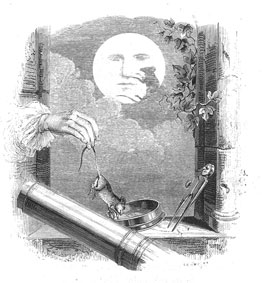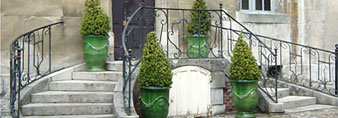THE SERPENT'S HEAD AND TAIL (VII, 17)
Two dreadful parts the serpent shows,
To human nature equal foes,
The head and tail both famous grown,
And to the cruel Parcae known.
Between the two of old arose
A quarrel never like to close,
For which should lead the way.
The head had always marched before the tail.
The tail to heaven was heard to wail,
And thus did say :
“ Many a league I'm forced to tread,
Just as it pleases Master Head :
And thinks he still to treat me so ?
His very humble servant, no.
Thank God, by birth I am designed
His equal, not to lag behind !
My poison is as prompt as his to kill,
Our blood the same—the same our hate,
Then give to both an equal fate.
Behold, in fine, my humble will :
Command the head that I precede ;
And in my turn I take the lead ;
I'll guide so well, thus placed before,
Complaints shall cease for evermore.”
Heaven to her prayer was cruelly kind ;
For often from its kindness evils come,
To blind requests it should be deaf and dumb.
The new conductress, who was just as blind
As one within an oven close confined,
Now knocked against a tree or wall,
Against a traveller or a stone ;
And down to Styx both came at last undone !
Woe to the states that in such error fall !
|
 |
An Animal in the moon
( J.J. Grandville) |
|
AN ANIMAL IN THE MOON (VII,18)
Men of their senses are the fools,
If one philosopher may be believed.
Another says by them we’re ne’er deceived
If we but rightly know to use our tools.
And both are right. Our sense is lent
A mean, we must not trust to it alone.
But then again the sense will cozen none
If we consider distance, instrument,
And medium. ’Twas wisely planned,
The proof is not just now at hand.
Some day I’ll give it. From our ground
The sun appears but three feet round,
But if I see it from the sky,
It is of all our world the eye.
Its distance shows me its true size,
Its sides and angle I surmise.
The fool believes it's flat ; it's round I know,
I know it rests, I know the dull earth moves ;
My mind the error of my sight can show,
And all my senses’ first idea disproves.
My mind, in fact, all the world over,
Detects the true beneath the cover.
I cannot really quite agree
With eyes somewhat too quick to see,
Or ears, again, somewhat too slow.
A crooked stick the waters show,
My reason makes it straight again,
My eyes deceive me but in vain.
The moon has in’t a woman’s head, they say :
I know it can’t be so, but then its shape,
There high, there low, gives reason for this jape.
Men may find in’t an elephant some day,
And something of this kind has England seen,
A strange, portentous animal, I ween.
There was sure change they said within the moon,
No doubt we should hear wondrous tidings soon.
Perhaps the many horrid wars
Which vex the French were presaged by this sign.
The king himself did graciously incline
To see this beast amid the stars,
And after all what was it but a mouse
Which in the telescope had made his house ?
The English laughed. I would the chance
Of laughter came just now to France,
To us who gain the laurel crown,
The while our foes the combat fear,
For victory holds Louis dear ;
And we shall live in his renown ;
The daughters fair of Memory
Are with us still, we pleasures find.
We wish for peace, but do not sigh
That peace which Charles' valiant mind
Has brought to England after war's array,
With all the plays and games it knows to-day.
Oh, could he our unhappy quarrel stay,
What incense would be his, the second name
Among the Caesars weighs the first in fame.
Ah, happy English ! when will Peace atone
Our feuds, that we too may seek Art alone ? |
|



